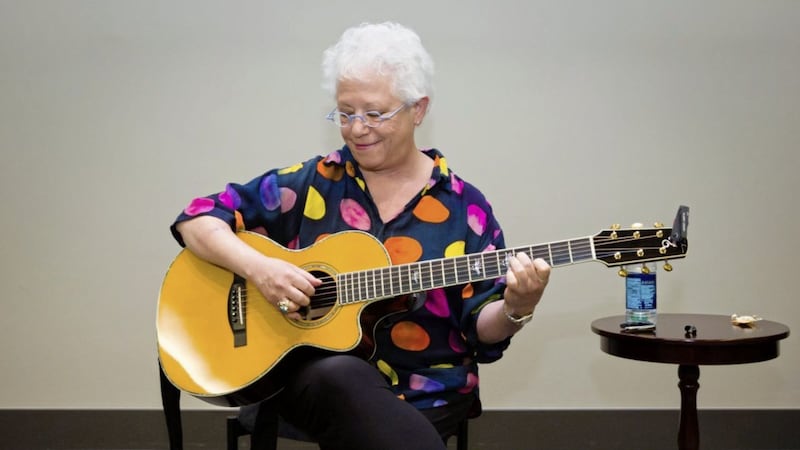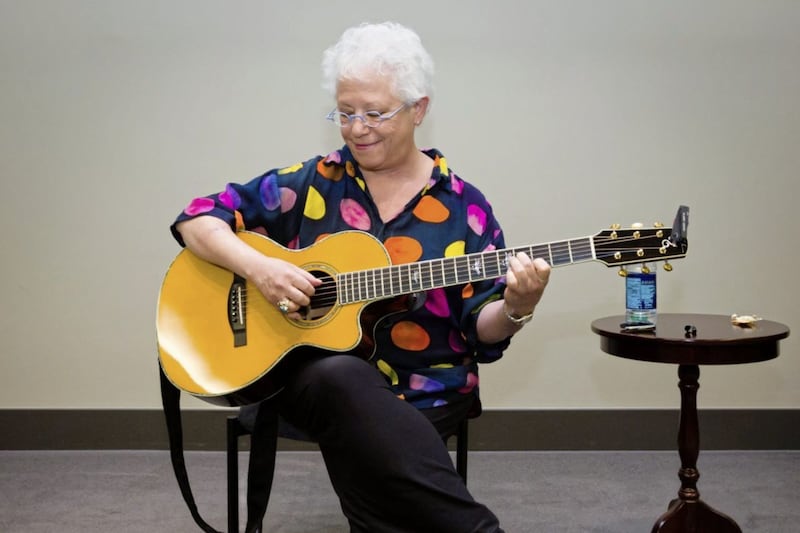FOR so many people, the songs of Janis Ian have been a loyal companion to them, on and off, for over half a century.
Her word-perfect songs have wrapped us up in a warm blanket or given voice to our rage and held a mirror up to not just America, but to humankind. Her art isn't based on sentimentality but on her own lived experience, a lot of it quite dark but one that is also filled with joy and gratitude.
By the time she was 37, Janis Ian had been robbed, sexually abused, got heavily into drugs (with Janis Joplin and Jimi Hendrix), physically beaten by her husband and ended up losing everything she owned thanks to a less than scrupulous accountant.
But the message of her new album, The Light at the End of the Line, is an uplifting one of beauty and positivity, though not in a mushy, sentimental way - there is anger and determination on the album too.
And there she was, this living legend in front of me on Zoom, as we chatted about her life and work, from Society's Child and At Seventeen to her latest collection which she describes as her "swan song" before she does her final US tour. The art of the goodbye.
(Yes, she might be coming to Europe... but nothing is certain in these unprecedented times).
Janis has been in and out of the notoriously cruel music business since her early teens but now in her 71st year, she admits she gets tired of people asking if she's still making music or still an artist.
"That's what I am. I'm still standing, whether I'm being famous or not, I'm still standing," she says, referring to the new album's opening track, an ode to being older but wiser.
Sadly, the second track is very relevant in Ireland at the minute after the murder of Ashling Murphy.
"Resist is about me suddenly realising how many times in my life as a woman I've had to fight battles that a man wouldn't have had to fight but also realising that we're all in it together, men and women, and we have to fix it together," says Janis.
Stranger refers to her grandparents who emigrated from Russia through Ellis Island, telling a story that again will resonate in Ireland while Nuala Kennedy features on the gorgeous Swannanoa and the album cover was by Irish photographer Neil Fennessy.
The title track, however, The Light at the End of the Line, tells of the trauma that Janis went through after she recorded Society's Child, her first record.
It deals with the relationship of a young couple in 1960s America, a white girl and a black boy.
When she takes the boy home to meet her parents, she's promptly told by her mother, "Honey, he's not our kind", but rather than taking a principled stand, the girl tells her boyfriend she can't see him any more, "Cause baby, I'm only society's child".
Incredibly Janis was only 14 when she wrote the song but it remains astonishingly powerful today but in the volatile USA of the mid-1960s, it caused ructions and Ian received death threats and had razor blades sent to her, bookings were cancelled and even a radio station who dared to play it was burned down. You can imagine the impact on the young Janis Ian.
"Part of the healing was deciding to stay after shows, meeting and connecting with my audience, she explains.
"Once I realised I was going to stop doing that, I wanted to tell them how much I love them. It sounds corny, but there it is," she writes on her website.
However, The Light at the End of the Line wasn't exactly the way Janis wanted to finish the album - "that was just too hard a way to leave," she says - so she set to work on Better Times Will Come, written two days after the death of John Prine which brings a truly joyful, rollocking end to a glorious album.
"I really believe what that song says," says Janis. "A lot of people have said to me: 'You saved my life, you saved me,' but there would have been someone else, there will always be someone else. I firmly believe that because there were other people there for me. So better times will come. Music will be there. Art will be there. We have to believe that we know that."
Over her career, Ian has whispered into the ears of the lonely and the awkward and the afraid, telling them that things will turn out OK - and she should know from her own experience.
Her best-loved song, the sublime At Seventeen, tapped into the teenage angst that most of us went through and Janis Ian was particularly aware of a kind of "beauty apartheid" - she having rather gawkish looks, bad skin and short curly hair at summer camp while the other girls had long blonde hair, parted in the middle.
When you're a teenager, these things can become all-consuming - probably more is in this age of social media - but added to insecurity about her looks, growing up, Janis, her brother Eric and their parents were constantly on the move because of FBI suspicions that Janis's Jewish atheist father was in fact a communist.
At the time, teachers were made full-time after spending two years at the same school but coming to the end of the two-year period, the FBI would visit the school principal and that was the end of that job, so every second summer the family would have to up sticks and move on.
"It was difficult being uprooted," Janis recalls.
"To have to constantly change cities and counties. That was hard. Changing schools was really hard. The minute you start making friends, you feel like everything's ripped away. But on the other hand, it did give me an appreciation for change."
From a very early age, though, Janis was immersed in music. I love a sentence in her Wikipedia entry which says: "Starting with piano lessons at the age of two (at her own insistence)..."
But why does Janis Ian write songs? Just because she's good at it? Does she have a message she wants to share with the world? Is it simply to express herself?
"I don't think anybody starts off writing because they have some kind of grand message they want to share. You just start because that's what that's what's in you.
"My teacher Stella Adler used to say that we all thought we were in the performing arts because we wanted to be famous, but we were wrong. We were in the arts because there was something in us too big to get out any other way.
"And I think that's probably a better explanation than anything I could give."
::The Light at the End of the Line by Janis Ian is released today on her own Rude Girl Records label; it is sublime.



